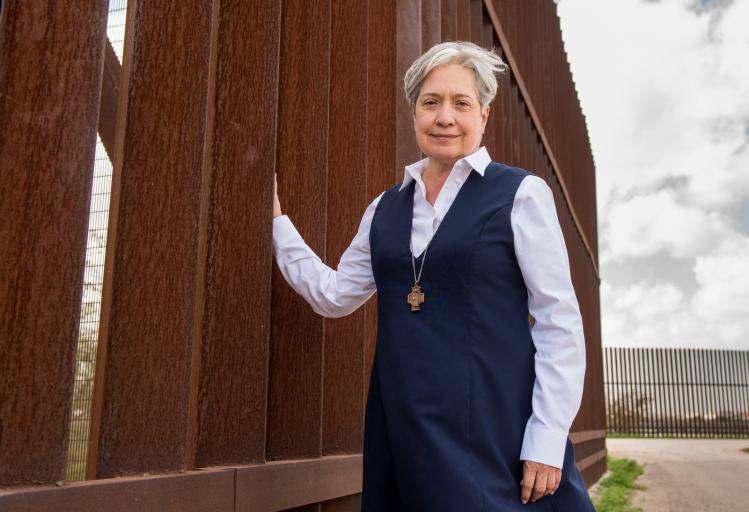
Sister Norma Pimentel is Executive Director of Catholic Charities of the Rio Grande Valley. Last week, when President Trump traveled to the border, he met with Pimentel and other leaders. A religious sister with the Missionaries of Jesus, Pimentel has led the charitable work of the Diocese of Brownsville, Texas since 2008. She oversees emergency assistance, homeless prevention, disaster relief, clinical counseling, pregnancy care, and food programs for all four counties of the Rio Grande Valley. In a town-hall event hosted by ABC’s 20/20 before Pope Francis’s visit to the United States in 2015, the pope praised Pimentel’s welcoming ministry for immigrants. Last spring, the University of Notre Dame honored Sr. Norma with the Laetare Medal, the oldest and most prestigious Catholic award in the United States. She spoke with Commonweal contributing writer John Gehring about President Donald Trump’s visit to the border last week and what she has learned from working with immigrants.
John Gehring: President Trump just visited your community. You were in the room during a round-table conversation. Who was there and how would you describe the meeting?
Sr. Norma Pimentel: I was invited to the meeting with the President. Those present were politicians, law-enforcement representatives, a rancher, two relatives of fallen officers, and a pastor from Waco.
JG: Were you surprised that you and other local leaders were not allowed to speak?
NP: I was more than surprised. I was disappointed. Local people were not given the chance to speak. We (the locals) were invited to be part of the President’s efforts to state that we have an emergency at the border.
JG: What would you have said to President Trump if given the chance?
NP: I would have thanked him for coming to McAllen and asked him to visit the Respite Center. I would have spoken to him about the families we serve who are poor and vulnerable. We sense a responsibility to help them. I would also talk to him about our community. We are a very generous, compassionate community that cares about helping those we see suffering.
JG: Why do you think the President and conservative politicians are obsessed with a wall?
NP: I think that those who are convinced that we need a wall are not from here, and they don’t really know the reality of life at the border. For us it is very important that our community is safe. Our cities here at the border are among the safest in the United States. I respect our border patrol and the work they do to control who enters our country. Having safe communities depends on us building bridges that bring us together rather than divide us. We need to learn how to be united as one community. Respecting and defending all life is important and must be placed first.
JG: What myths do people have about the border?
NP: I think a big myth is that the border is a very dangerous and lawless community. The reality is that we are a safe and loving community that works with and appreciates the work of border-patrol officers, and values the human life of the migrants. We live and work together, and we share the same goals of safety and the humane treatment of the vulnerable. Also, I think people do not understand how connected we are to Mexico—through family, business, and cultural connections. We have a strong relationship.
JG: When did you first start working with immigrants on the border and what have you learned over those years?
NP: I’m a native of the Rio Grande Valley. I’ve lived here all my life. I entered religious life here at the border with the Missionaries of Jesus. The Sisters always welcomed immigrant families, moms with their young infant kids, when they were released from the Bayview detention facility. Our community welcomed immigrant families all the time. That generous, welcoming spirit was what I learned from the Missionaries of Jesus, and it is an enduring element of the Catholic faith.
JG: You have a good relationship with border patrol. How did that relationship develop and what does it look like?
NP: Back in 2014, when our Respite Center responded to help the many immigrant families in dire need of help, we were restoring human dignity. The whole community was part of the response. It was important that everyone sat at the table and worked together to make sure we properly helped the families. So we did. We all came together for that higher goal. We have always been an extraordinary community that respects each other.
JG: How do we get past fear mongering and political slogans to finally address our broken immigration system?
NP: I think we need to stop demonizing the immigrant who just wants a safe, good life and also stop demonizing the border-patrol officer who wants to keep us safe. We need to remember that they are both human beings, and that we need dialogue. It is vital that we keep remembering the human element of this issue. We must look past statistics and talking points, and remember that we are all God’s children.
JG: It’s a dark time for immigrants. What keeps you hopeful?
NP: A child’s face gives me hope. The joy of seeing the innocent, vulnerable life before me reminds me of the responsibility we all have to make life for everyone better. It is what keeps me connected to my God, who each morning nourishes me with His presence in the Holy Eucharist.

